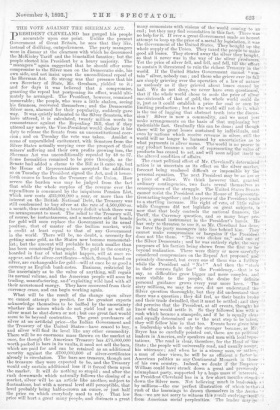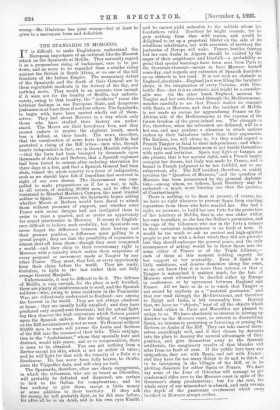THE VOTE AGAINST THE SHERMAN ACT.
PRESIDENT CLEVELAND has gauged his people accurately upon one point. Unlike the present Government of Great Britain, he sees that they like, instead of disliking, outspokenness. The party managers were in dismay at the clearness with which he denounced the McKinley Tariff and the bimetallist fanatics ; but the people elected him President by a heavy majority. The " managers " again suggested that he should offer some compromise to the Silver men on the Democratic side, his own side, and not insist upon the unconditional repeal of the Sherman Act. So strong was that pressure that his own Secretary of State, Mr. Gresham, yielded to it ; and for days it was believed that a compromise, granting the repeal but postponing its effect, would ulti- mately be arranged. The President, however, remained immovable ; the people, who were a little shaken, seeing his firmness, recovered themselves ; and the Democratic Silver, men, alarmed for their popularity, suddenly gave way. It was quietly intimated to the Silver Senators, who have uttered, it is calculated, twenty million words in remonstrance against the Repealing Bill, that if they uttered any more, the Vice-President would declare it his duty to release the Senate from an unconstitutional coer- cion ; and on Tuesday the vote was taken. Amidst a scene of unparalleled excitement, with Senators from the Silver States actually weeping over the prospect of their miners' suffering and their own profits growing less, the Sherman Act was unconditionally repealed by 48 to 37. Some formalities remained to be gone through, as the Senate had added a clause to the Bill as it came up, but the House of Representatives accepted the addition ; so on Tuesday the President signed the Act, and it hence- forth ceases to burden the Treasury of the Union. How severe the burden was may be judged from the fact that while the whole surplus of the revenue over the expenditure is consumed by the iniquitous Pension List, which now costs .233,000,000 a year, or more than the interest on the British National Debt, the Treasury was still condemned to buy silver at the rate of 4,500,000 oz. a month, thus establishing a heavy deficit which there was no arrangement to meet. The relief to the Treasury will, of course, be instantaneous, and a moderate sale of bonds for gold will soon replace the Government in its usual position, that of master of the bullion market, with a credit at least equal to that of any Government in the world. There will be, no doubt, a necessity for getting some gold, as the States now become monometal- list; but the amount will probably be much smaller than has been occasionally imagined. The gold in the country, hoarded in fear of what might happen, will at once re- appear, and the silver-certificates—which, though based on silver, are exchangeable for gold—will at once be as good a currency as English bank-notes. Business, restricted by the uncertainty as to the value of anything, will regain its normal volume, and the American people will soon be trading, manufacturing, and'exploiting wild land with all their accustomed energy. They have recovered from their currency craze, and can begin working again.
What will be the result of the change upon silver we cannot attempt to predict, for the greatest experts acknowledge themselves to be baffled by the uncertainty whether the mines which do not yield lead as well as silver must be shut-down or not ; but one great fact would seem to be beyond contention. The great purchasers of silver at an artificial price—the Indian Government and the Treasury of the United States—have ceased to buy, and silver will find its level like any other commodity. There will be no enormous mass thrown on the market at once, for though the American Treasury has £75,000,000 worth packed in bars in its vaults, it need not sell the bars, which are paid for and can be retained as an additional security against the £100,000,000 of silver-certificates already in circulation. The bars are treasure, though not the treasure they were expected to be, and the Treasury would only sustain additional loss if it forced them upon the market. It will do nothing so stupid ; and after the rush downwards, which naturally follows the closing of a market, silver will be an article like another, subject to fluctuations, but with a normal level still perceptible, that level probably being half-a-crown an ounce, or just half the price on which everybody used to rely. That low price will hurt a great many people, and distracts a great many economists with visions of the world coming to an end ; but they may find consolation in this fact. There was no help for it. If ever a great Government made an honest attempt to keep up the price of a metal by legislation, it was the Government of the United States. They bought up the whole supply of the Union. They taxed the people to make good all losses. They stowed away the silver they bought, so that it never was in the way of the silver producers. Yet the price of silver fell, and fell, and fell, till the effort to sustain it threatened to ruin the richest Treasury in the world. If the United States Government cannot " sus- tain" silver, nobody can ; and those who grieve over its fall are simply grieving over the operation of a law of nature as uselessly as if they grieved about losses caused by hail. We do not deny, we never have even questioned, that if the whole world chose to make the price of silver one-sixteenth of that of gold, the whole world could do it, just as it could establish a price for coal or corn by limiting production ; but as the world will not do it, what is the use of lugging that abstract truth into the discus- sion ? Silver is now a commodity, and we must just make arrangements on the basis of that unpleasing but undeniable fact. Gradually this can be done; and though there will be great losses sustained by individuals, and even by nations which receive revenue in silver, still the world will no longer be harassed by uncertainties as to what payments in silver mean. The world is no poorer in any product because a mode of representing the value of products has ceased to act, and will soon adjust itself to the altered condition of affairs.
The exact political effect of Mr. Cleveland's determined action is as uncertain as its effect on the silver market.
forecast being rendered difficult or impossible by the personal equation. The next President may be an ass or a piece of willow. We think however that, granted ordinary contingencies, two facts reveal themselves as consequences of the struggle. The United States Senate cannot resist the President and the House of Representa- tives acting together ; and the power of the President tends to a startling increase. His right of veto; of little value while Congress did not legislate on great subjects, is now that that body controls the national finances, the Tariff, the Currency question, and so many huge pro- jects, a grand instrument in the President's hands. He has only to threaten to use it, as Mr. Cleveland has done, to force the party managers into line behind him. They cannot make compromises or bargains if the President• does not like them. " The veto chokes us," said one of the Silver Democrats ; and he was entirely right, the very purposes of his faction being shown from the first to be beyond realisation. There were thirty or more carefully considered compromises on the Repeal Act proposed and privately discussed, but every one of them was a futility while the President said " No ! " And then the " stars in their courses fight for " the Presidency,—that is to say, as difficulties grow bigger and more complex, and more visible to the people, the desire for definite personal guidance grows every year more keen. The sixty millions, we may be sure, did not understand the Silver question thoroughly, but they did understand that ' there was a question ; they did feel, as their banks broke and their trade dwindled, that it must be settled ; and they' did perceive that the President, at all events, thought he knew what would settle it. So they followed him with a rush which became a stampede, and if he is equally clear• and equally determined as to the next step to be taken, they will follow him in that too. Events have given him a leadership which is only the stronger because, as Mr. Bryce has so carefully pointed out, there are no political leaders in America, only speakers and men with local tern- tations. The road is clear, therefore, for the Head of 'the ' State ; the people will universally read, and usually accept, his utterance ; and when he is a strong man, or rather; a man of clear views, ho will be as efficient a factor in American politics as any Continental Monarch in those of his own country. Indeed, we doubt if the Emperor William could have struck down a great and previously' triumphant party, supported by a huge mass of intereRt13, as President Cleveland has in a few short months Oliva-, 4 down the Silver men. Not believing much in leadershilp I ; by millions—the one perfect illustration of which %utile ;I, rush of the lemmings to drown themselves in the Ambit: Sea—we are not sorry to witness this result evolvingeitself, • from American social perplexities. The leader may, go





















































 Previous page
Previous page